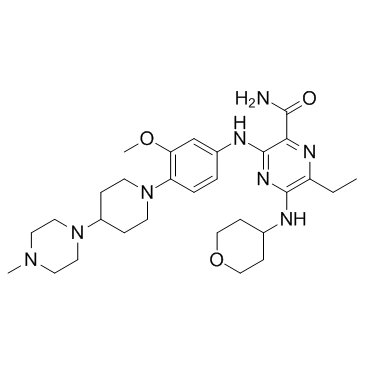
Gilteritinib
CAS No. 1254053-43-4
Gilteritinib ( ASP2215 | ASP-2215 )
产品货号. M11028 CAS No. 1254053-43-4
一种有效的 FLT3/AXL 抑制剂,IC50 分别为 0.73 nM/0.29 nM。
纯度: >98% (HPLC)
 COA
COA
 Datasheet
Datasheet
 HNMR
HNMR
 HPLC
HPLC
 MSDS
MSDS
 Handing Instructions
Handing Instructions
| 规格 | 价格/人民币 | 库存 | 数量 |
| 2MG | ¥405 | 有现货 |


|
| 5MG | ¥664 | 有现货 |


|
| 10MG | ¥996 | 有现货 |


|
| 25MG | ¥1596 | 有现货 |


|
| 50MG | ¥2357 | 有现货 |


|
| 100MG | ¥3702 | 有现货 |


|
| 200MG | 获取报价 | 有现货 |


|
| 500MG | 获取报价 | 有现货 |


|
| 1G | 获取报价 | 有现货 |


|
生物学信息
-
产品名称Gilteritinib
-
注意事项本公司产品仅用于科研实验,不得用于人体或动物的临床与诊断
-
产品简述一种有效的 FLT3/AXL 抑制剂,IC50 分别为 0.73 nM/0.29 nM。
-
产品描述A potent FLT3/AXL inhibitor with IC50 of 0.73 nM/0.29 nM respectively; also inhibits LTK and ALK (IC50=0.35 nM and 1.2 nM respectively), and shows >800-fold selectivity over c-Kit; inhibits the growth of Ba/F3 cells expressing either FLT3-ITD, FLT3-D835Y, FLT3-ITD-D835Y, FLT3-ITD-F691 L, and FLT3-ITD-F691I, with IC50 of 1.8 nM, 1.6 nM, 2.1 nM, 22 nM, and 49 nM, respectively; orally bioactive.Blood Cancer Phase 3 Clinical(In Vitro):Of the 78 tyrosine kinases tested, Gilteritinib (ASP2215) inhibits FLT3, leukocyte tyrosine kinase (LTK), anaplastic lymphoma kinase (ALK), and AXL kinases by over 50% at 1 nM with an IC50 value of 0.29 nM for FLT3, approximately 800-fold more potent than for c-KIT. Gilteritinib inhibits the activity of eight of the 78 tested kinases by over 50% at concentrations of either 1 nM (FLT3, LTK, ALK, and AXL) or 5 nM (TRKA, ROS, RET, and MER). The IC50s are 0.29 nM for FLT3 and 0.73 nM for AXL. Gilteritinib inhibits FLT3 at an IC50 that is approximately 800-fold more potent than the concentration required to inhibit c-KIT (230 nM). The antiproliferative activity of Gilteritinib is evaluated against MV4-11 and MOLM-13 cells, which endogenously express FLT3-ITD. After 5 days of treatment, Gilteritinib inhibits the growth of MV4-11 and MOLM-13 cells with mean IC50s of 0.92 nM (95% CI: 0.23-3.6 nM) and 2.9 nM (95% CI: 1.4-5.8 nM), respectively. Growth suppression of MV4-11 cells is accompanied by inhibition of FLT3 phosphorylation. Relative to vehicle control cells, phosphorylated FLT3 levels are 57%, 8%, and 1% after 2 h of treatment with 0.1 nM, 1 nM, and 10 nM Gilteritinib, respectively. In addition, doses as low as 0.1 nM or 1 nM result in the suppression of phosphorylated ERK, STAT5, and AKT, all of which are downstream targets of FLT3 activation. To investigate the effects of Gilteritinib on AXL inhibition, MV4-11 cells that expressed exogenous AXL are treated with Gilteritinib. At concentrations of 1 nM, 10 nM, and 100 nM for 4 h, Gilteritinib treatment decreases phosphorylated AXL levels by 38%, 29%, and 22%, respectively.(In Vivo):In MV4-11 xenografted-mice, the concentration of Gilteritinib (ASP2215) in tumors is more than 20-fold higher than that in plasma with oral administration of Gilteritinib at 10 mg/kg for 4 days. Treatment of Gilteritinib for 28 days results in dose-dependent inhibition of MV4-11 tumor growth and induces complete tumor regression at more than 6 mg/kg. Further, Gilteritinib decreases tumor burden in bone marrow and prolonged the survival of mice intravenously transplanted with MV4-11 cells.
-
体外实验Of the 78 tyrosine kinases tested, Gilteritinib (ASP2215) inhibits FLT3, leukocyte tyrosine kinase (LTK), anaplastic lymphoma kinase (ALK), and AXL kinases by over 50% at 1 nM with an IC50 value of 0.29 nM for FLT3, approximately 800-fold more potent than for c-KIT. Gilteritinib inhibits the activity of eight of the 78 tested kinases by over 50% at concentrations of either 1 nM (FLT3, LTK, ALK, and AXL) or 5 nM (TRKA, ROS, RET, and MER). The IC50s are 0.29 nM for FLT3 and 0.73 nM for AXL. Gilteritinib inhibits FLT3 at an IC50 that is approximately 800-fold more potent than the concentration required to inhibit c-KIT (230 nM). The antiproliferative activity of Gilteritinib is evaluated against MV4-11 and MOLM-13 cells, which endogenously express FLT3-ITD. After 5 days of treatment, Gilteritinib inhibits the growth of MV4-11 and MOLM-13 cells with mean IC50s of 0.92 nM (95% CI: 0.23-3.6 nM) and 2.9 nM (95% CI: 1.4-5.8 nM), respectively. Growth suppression of MV4-11 cells is accompanied by inhibition of FLT3 phosphorylation. Relative to vehicle control cells, phosphorylated FLT3 levels are 57%, 8%, and 1% after 2 h of treatment with 0.1 nM, 1 nM, and 10 nM Gilteritinib, respectively. In addition, doses as low as 0.1 nM or 1 nM result in the suppression of phosphorylated ERK, STAT5, and AKT, all of which are downstream targets of FLT3 activation. To investigate the effects of Gilteritinib on AXL inhibition, MV4-11 cells that expressed exogenous AXL are treated with Gilteritinib. At concentrations of 1 nM, 10 nM, and 100 nM for 4 h, Gilteritinib treatment decreases phosphorylated AXL levels by 38%, 29%, and 22%, respectively.
-
体内实验In MV4-11 xenografted-mice, the concentration of Gilteritinib (ASP2215) in tumors is more than 20-fold higher than that in plasma with oral administration of Gilteritinib at 10 mg/kg for 4 days. Treatment of Gilteritinib for 28 days results in dose-dependent inhibition of MV4-11 tumor growth and induces complete tumor regression at more than 6 mg/kg. Further, Gilteritinib decreases tumor burden in bone marrow and prolonged the survival of mice intravenously transplanted with MV4-11 cells.
-
同义词ASP2215 | ASP-2215
-
通路Tyrosine Kinase
-
靶点FLT3
-
受体FLT3|AXL
-
研究领域Cancer
-
适应症Blood cancer
化学信息
-
CAS Number1254053-43-4
-
分子量552.7115
-
分子式C29H44N8O3
-
纯度>98% (HPLC)
-
溶解度DMSO
-
SMILESCCC1=C(N=C(C(=N1)C(=O)N)NC2=CC(=C(C=C2)N3CCC(CC3)N4CCN(CC4)C)OC)NC5CCOCC5
-
化学全称2-Pyrazinecarboxamide, 6-ethyl-3-[[3-methoxy-4-[4-(4-methyl-1-piperazinyl)-1-piperidinyl]phenyl]amino]-5-[(tetrahydro-2H-pyran-4-yl)amino]-
运输与储存
-
储存条件(-20℃)
-
运输条件With Ice Pack
-
稳定性≥ 2 years
参考文献
1. Mori M, et al. Invest New Drugs. 2017 May 17. doi: 10.1007/s10637-017-0470-z.
2. Lee LY, et al. Blood. 2017 Jan 12;129(2):257-260.
产品手册




关联产品
-
Maslinic acid
Maslinic Acid 是一种 DNA 聚合酶 B 抑制剂。
-
CGS 27023A
CGS 27023A 是一种非肽类、有效的、具有口服活性的溶质素抑制剂。
-
Tetrahydrocoptisine
四氢黄连碱具有有效的抑制炎症作用。四氢黄连碱通过抑制 NF-κB 信号通路对 LPS 诱导的 ALI 具有保护作用,可能涉及抑制肺部炎症过程。



 021-51111890
021-51111890 购物车(0)
购物车(0)
 sales@molnova.cn
sales@molnova.cn







